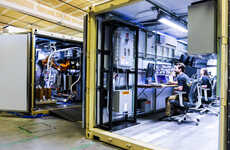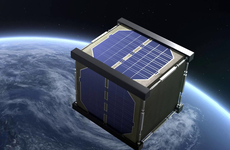
The Orbex Prime Rocket Utilizes Bio-Propane and a 3D-Prinited Engine
Niko Pajkovic — May 13, 2022 — Tech
References: orbex.space & spaceexplored
Nano satellite company Orbex Space has officially revealed its first full-scale mini-satellite called the Orbex Prime, which will be launching as a prototype from the company's Scotland-based launch site.
According to the company, the Orbex Prime was built specifically with sustainability in mind, which is why the vehicle utilizes bio-propane -- a low-carbon fuel that allows the mini-satellite to produce 90% fewer carbon emissions than traditional hyrdocarbon-powered satellites. What's more, the Orbex Prime is equipped with a 3D-printed engine, which aligns the company with other leading innovators within the space such as Rocket Lab and Relatively Space.
"To deliver the performance and environmental sustainability we wanted from a 21st century rocket we had to innovate in a wide number of areas – low-carbon fuels, fully 3D-printed rocket engines, very lightweight fuel tanks, and a novel, low-mass reusability technology," said Chris Lamour, Orbex CEO.
Image Credit: Orbex Space
According to the company, the Orbex Prime was built specifically with sustainability in mind, which is why the vehicle utilizes bio-propane -- a low-carbon fuel that allows the mini-satellite to produce 90% fewer carbon emissions than traditional hyrdocarbon-powered satellites. What's more, the Orbex Prime is equipped with a 3D-printed engine, which aligns the company with other leading innovators within the space such as Rocket Lab and Relatively Space.
"To deliver the performance and environmental sustainability we wanted from a 21st century rocket we had to innovate in a wide number of areas – low-carbon fuels, fully 3D-printed rocket engines, very lightweight fuel tanks, and a novel, low-mass reusability technology," said Chris Lamour, Orbex CEO.
Image Credit: Orbex Space
Trend Themes
1. Eco-friendly Spacecraft - Opportunities for companies to develop low-carbon footprint rockets similar to the Orbex Prime with the use of bio-propane fuel and 3D-printed engines.
2. Additive Manufacturing in Space Industry - Opportunities for companies to incorporate 3D printing technology in the design and production of satellite components, similar to Orbex Prime's 3D-printed engine.
3. Low-carbon Space Launching Sites - Opportunities for companies to implement sustainable practices in space launching sites, similar to Orbex Space's Scotland-based launch site that utilizes low-carbon fuel.
Industry Implications
1. Space Industry - Innovative rocket designs and the usage of sustainable practices, like the Orbex Prime's bio-propane fuel and 3D-printed engine, could open a new era of spacecraft production.
2. Manufacturing Industry - 3D printing technology implementation in space industry could generate new demand and challenges for manufacturing industries to produce extraterrestrial-level materials and innovate to meet the demands of the industry.
3. Green Energy Industry - Bio-propane fuel could revolutionize spacecraft fuel usage, and companies in the green energy sector could capitalize on this emerging market, competing with traditional fossil-fuel based energy.
5
Score
Popularity
Activity
Freshness























